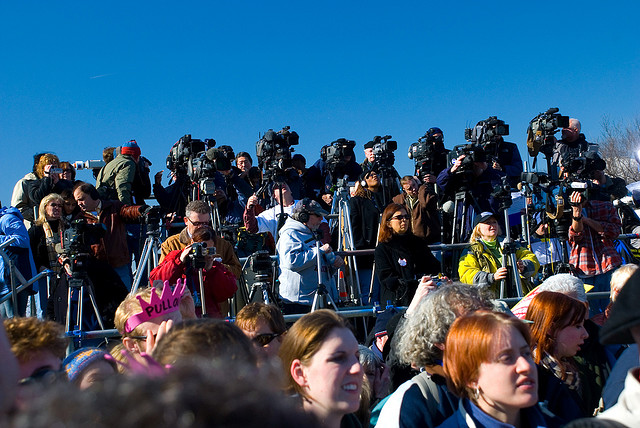The future of print journalism is an issue that has been bludgeoned to death. In fact, it’s deader than the issue that print journalism is dead. The common consensus on this matter has already been finalised: Print media will not die, it will adapt, evolve and transform into a better version of itself. What will die are those print publications that remain stuck in the past because they neglect to acknowledge the effect the Internet has on the medium.
I established the importance of adapting to new media in a previous blog, and emphasised that multimedia skills are fast becoming a prerequisite for journalists. Just the other day in fact, I scoped out an entry-level position that required the candidate to have at least 60 respectable followers on Twitter. It’s a no-brainer that being new-media savvy is extremely important if you want to make a success of your career, but be warned, this is the barest minimum you need to have mastered. Branding yourself, I believe, is the next important step to becoming a serious journalist. In fact, I predict that in ten years time this too will become a prerequisite for new job-seeking graduates.
What is Branding, Really?
Branding is a concept that originated in marketing and advertising. We all hear “Just Do It” in our minds when we see the trademark Nike “Swoosh” and Coca-Cola is, of course, Coca-Cola. These are two of the best examples of effective branding to date, something that all marketers and advertisers strive for with each particular brand they represent. But what has this got to do with journalism?
Every journalist needs to have a personal brand. When someone says your name (especially in the industry), people need to know and recognise it. Your name should not be associated with the brand of the publication you are working for. Each publication is a brand in and of itself. You may personally be working for that brand and you may represent that brand as an employee but it is not your brand. What happens, for instance, if you move on to work at a different publication? What will happen if you lose your job? Without a brand, you have no identity in your field. Your brand is your reputation – word-of-mouth can only take you so far.
The Internet Was a Game Changer
We all know that potential employers will inevitably Google us too check our credibility – to make sure we are who we say we are. A good reference can go a long way but a Google search result that mentions your name and shares links to who you are as a journalist can take you further.
Marketers and advertisers are onto something when it comes to branding, now more than ever. We are living in a consumer-driven world; with the financial pickle the industry is in, it is necessary to market yourself as a product.
The Edge of Authenticity
The ethics behind marketing yourself as a product may sound shady. Our responsibility as journalists is, after all, to the people and to the truth. Our job is not about self-promotion; it’s about the effective dissemination of information.
Gene Weingarten, a vetevesran journalist who writes for The Washington Post is a branding cynic. According to him, “It is disheartening to learn that journalism schools are … urging their students to market themselves like Cheez Doodles”. Weingarten has an obvious distaste for the concept of branding, and to an extent, he’s right. Journalism is absolutely not about self-promotion and (as Weingarten puts it), journalism is also a calling, not a commodity.
Yes, the sole purpose of branding for marketers and advertisers is promotion but journalists have an additional edge: authenticity. If you’re considering developing your professional brand, it should be for the right reasons. Will your brand represent the fundamental journalistic principles of truth, verification, balance and fairness, or will your brand represent only you at face value?
Yes, there are many journalists whose brands only represent how great they are and what they’ve accomplished and how extensive their portfolio is. But I think the true test of character is to see how branding can promote journalistic values and truthfully represent a credible, authentic branch of the industry.
A ‘How-To’ To Follow
That being said, it’s difficult to know where to start if and when you do decide to put your name out there. Watch this space for a ‘How-To’ piece on branding – journalism style.
About the Author

Samantha also works as an assistant lecturer for the University of Pretoria’s Department of Journalism.
Photo credit: flickr.com_scott*eric
ABOUT THE WRITERS’ COLLEGE
(NZ Writers’ College, SA Writers’ College, UK Writers’ College)
We are an online writing school with three country-specific branches offering 29 specialist online writing courses run by multi-award-winning authors, journalists, scriptwriters, poets and copywriters. From journalism to creative writing courses to writing for the web, our courses offer one-to-one tuition at an affordable cost.
Our tutors have collectively accumulated more than 40 international writing awards, including many Qantas Awards, several Commonwealth Writers’ Prizes, four Emmy Awards, the Montana New Zealand Book Awards, ATKV Awards, the Caine Prize for African Writing, the Pen/HSBC Awards, the Sir David Beatie Award, the George Foster Peabody Award and the Reed Fiction Award.
We offer no-nonsense, practical, challenging training for writers who are serious about getting published.













